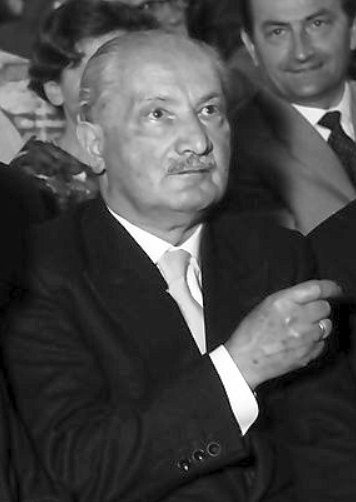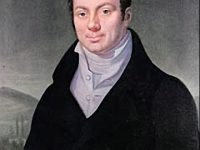
Martin Heidegger (1889-1976), photo: Willy Pragher, CC BY-SA 3.0, via Wikimedia Commons
On September 26, 1889, German philosopher Martin Heidegger was born. He is best known for his existential and phenomenological explorations of the “question of Being”. His best known book, Being and Time, is considered one of the most important philosophical works of the 20th century. There as also in his later writings, Heidegger maintained that our way of questioning defines our nature. He argued that philosophy, Western Civilization‘s chief way of questioning, had lost sight of the being it sought. Finding ourselves “always already” fallen in a world of presuppositions, we lose touch with what being was before its truth became “muddled”. As a solution to this condition, Heidegger advocated a return to the practical being in the world, allowing it to reveal, or “unconceal” itself as concealment.
“Everyone is the other, and no one is himself. The they, which supplies the answer to the who of everyday Da-sein, is the nobody to whom every Da-sein has always already surrendered itself, in its being-among-one-another.”
– Martin Heidegger (Being and Time, 1927)
Martin Heidegger – Early Years
However, Heidegger also was a controversial figure in science and philosophy because of his affiliation with the Nazis. In private, but never in public, he later called it “the biggest stupidity of his life” (die größte Dummheit seines Lebens). Martin Heidegger was born September 26th, 1889 in the Black Forest region of Messkirch, Germany. After visiting the gymnasium at Constance and Freiberg, he boarded at the archiepiscopal seminary of St. Georg. A mentor, Dr. Conrad Grober, gave him a copy of Franz Brentano‘s “On the Manifold Meaning of Being According to Aristotle,” which made a great impression on Heidegger. He took up studies to be a Jesuit by entering the Society of Jesus at Tisis, Austria, but likely for health reasons he was rejected. As an alternative, Heidegger decided to study for his priesthood at the Albert-Ludwig University in Freiberg, where he began lecturing and publishing papers. Here he first encounter the writings of philosopher Edmund Husserl,[3] and was also directed by his superiors to change his studies from theology to mathematics and philosophy. Heidegger embraced the change in his direction, studying closely the work of Husserl and completing his doctorate, “The Doctrine of Judgement in Psychologism,” in 1914. The following year he completed his habilitation with his dissertation, “The Doctrine of Categories and Signification in Duns Scotus.”
Being and Time
After his habilitation and serving in the German army, Heidegger spent a period teaching at the University of Marburg from 1923 to 1928, and then returned to Freiburg to take up the chair vacated by Husserl on his retirement. Heidegger’s main interest was ontology or the study of being. Although Heidegger’s academic and intellectual relationship with his Freiburg predecessor was complicated and occasionally strained, Heidegger’s dedicated his opus magnum Being and Time to Husserl, “in friendship and admiration”. Published in 1927, Being and Time is standardly hailed as one of the most significant texts in the canon of contemporary European Philosophy. It influenced heavily later programmes and ideas in the contemporary European tradition, including Sartre‘s existentialism, Gadamer‘s philosophical hermeneutics, and Derrida‘s notion of ‘deconstruction’. In Being and Time, Heidegger attempted to access being (Sein) by means of phenomenological analysis of human existence (Dasein) in respect to its temporal and historical character.
The Turn
After the change of his thinking (“the turn”), Heidegger placed an emphasis on language as the vehicle through which the question of being can be unfolded. He turned to the exegesis of historical texts, as of Kant,[4] Hegel,[6] Nietzsche [5] and Hölderlin, and to poetry, architecture, technology, and other subjects. Instead of looking for a full clarification of the meaning of being, he tried to pursue a kind of thinking which was no longer “metaphysical.” He criticized the tradition of Western philosophy, which he regarded as nihilistic, for, as he claimed, the question of being as such was obliterated in it. He also stressed the nihilism of modern technological culture.
Heidegger’s Language
The complexity of Heidegger’s language is legendary and staggering — but unlike so many other philosophers his intention was not to try and delve into highly abstract concepts, but rather to make more understandable the very immediate and relevant aspects of our everyday experience of life. For him, the critical error made in so much of Western philosophy has been to erase the distinction between human beings and objects.
National Socialism and Postwar Era
Heidegger’s philosophy is sometimes overshadowed by the enthusiastic support he showed for the Nazis and their education policies when he served as the Rector for the University of Freiburg 1933-34. He not only publicly converted to National Socialism, but he also deliberately distanced himself from his previously admired predecessor Edmund Husserl, because he had been Jewish. At the end of the war in 1945, a favorably disposed university de-Nazification commission found Heidegger guilty of having “consciously placed the great prestige of his scholarly reputation … in the service of the National Socialist Revolution,” and he was banned from further teaching until 1950. With his retirement, Heidegger regained his rights as a professor. He immediately announced a lecture and in the winter semester read for the first time again at the University of Freiburg. His lectures were very popular and, like his writings, were well received. Whereas the exact scope and nature of his Nazi sympathies remains a matter of debate. In 1967 Heidegger met with the Jewish poet Paul Celan, a concentration camp survivor. Celan visited Heidegger at his country retreat and wrote an enigmatic poem about the meeting, which some interpret as Celan’s wish for Heidegger to apologize for his behavior during the Nazi era. Martin Heidegger died on May 26, 1976.
Michael Sugrue, Heidegger: Being and Time, [10]
References and Further Reading:
- [1] Martin Heidegger at The Stanford Encyclopedia of Philosophy
- [2] Martin Heidegger at the Internet Encyclopedia of Philosophy
- [3] Edmund Husserl’s Phenomenology, SciHi Blog
- [4] Immanuel Kant – Philosopher of the Enlightenment, SciHi Blog
- [5] God is Dead – The Philosophy of Friedrich Nietzsche, SciHi Blog
- [6] Georg Friedrich Wilhelm Hegel and the Secret of his Philosophy, SciHi Blog
- [7] Johann Gottlieb Fichte and the German Idealism, SciHi Blog
- [8] Cogito Ergo Sum – René Descartes, SciHi Blog
- [9] Heidegger at Wikidata
- [10] Michael Sugrue, Heidegger: Being and Time, Michael Sugrue @ youtube
- [11] Otto Pöggeler, Martin Heidegger’s Path of Thinking, trans. by D. Magurshak and S. Barber, Humanities Press, 1987.
- [12] Leo Strauss, “An Introduction to Heideggerian Existentialism”, in The Rebirth of Classical Political Rationalism (University of Chicago: 1989).
- [13] English translations of Heidegger’s works
- [14] Works by or about Martin Heidegger at Internet Archive
- [15] Newspaper clippings about Martin Heidegger in the 20th Century Press Archives of the ZBW
- [16] Heidegger Timeline via Wikidata





